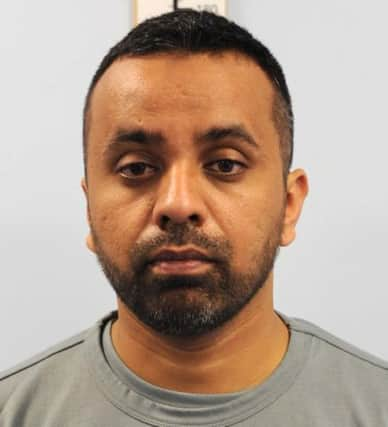British bomb-maker jailed for life


Black cab driver Anis Abid Sardar, 38, from Wembley in north-west London, built improvised explosive devices (IEDs) as part of a “deadly” campaign to kill Americans fighting in Iraq in 2007.
In what is believed to be a legal first, he was convicted yesterday at London’s Woolwich Crown Court of murder and conspiracy to commit murder.
Advertisement
Hide AdAdvertisement
Hide AdOne of the lethal weapons caused the death of 34-year-old Sergeant First Class Randy Johnson, of 2nd Stryker Cavalry Regiment, when it exploded under the armoured vehicle he was travelling in, on 27 September 2007.
Sardar was snared some seven years later after officials at the FBI’s Terrorist Explosive Device Analytical Centre found his fingerprints on some of the bombs.
The defendant, who was wearing a grey tracksuit, showed no emotion as he was sent down.
Judge Mr Justice Globe sentenced him to life with a minimum of 38 years on the murder count and life with a minimum of 25 years for the conspiracy to murder charge, to run concurrently.
The judge told Sardar that Sgt Johnson had been described by his commanding officer, Major Eric Adams, as showing “deep compassion” in leading his platoon. He said: “It is therefore the saddest irony that when the eight-wheel Stryker vehicle containing the American soldiers ran over and exploded an IED it was Sgt First Class Johnson who was killed.
“He was buried in Arlington Cemetery and his family can be proud that he was awarded the Purple Heart and Bronze Star. Sgt First Class Johnson’s loss was one of the sad tragedies in what was going on in Iraq in 2007.
“By the jury’s verdict it is a loss for which you are directly responsible.”
Mr Justice Globe described the IEDs built by Sardar and his co-conspirators as “professionally made” and “in effect landmines”. And he rejected Sardar’s defence that he had been involved just once in bomb-making to protect the Sunni community from Shia militias.
Advertisement
Hide AdAdvertisement
Hide AdThe judge said: “I am satisfied so as to be sure that your actions were not solely focused on Shia militias. Your focus was either wholly or party American. I am satisfied that at the material time of the offences you had a mindset that made Americans every bit the enemy as Shia militias. Both were in your contemplation at all times.”
Prosecutor Max Hill QC read a short message from Sgt Johnson’s widow Claudia in which she said: “Thank you so much, it’s a big relief to know that justice has been served.
“However, it does not change much for us. Randy will be greatly missed.”
Sardar originally denied to police that he had been “directly or indirectly” involved in bomb-making.
But on the second day of his trial he admitted that fingerprints on two of four devices found in or around the road west out of Baghdad and linked to the case were his.
The defendant was stopped at Heathrow and his fingerprints were taken after he made his way back to the UK from Syria some two months after Sgt Johnson was killed.